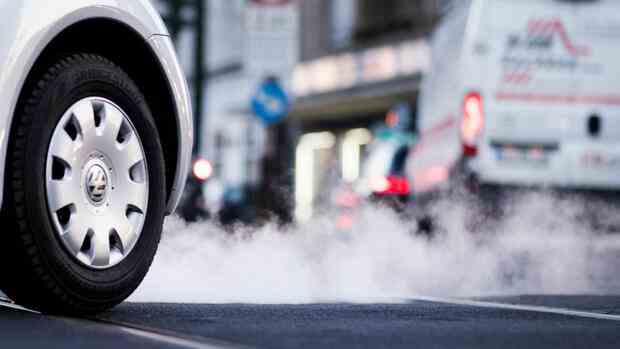Berlin, Brussels The EU Commission and the Federal Ministry of Transport are optimistic that the newly started talks about phasing out combustion engines will lead to a resilient result. Commission Vice President Frans Timmermans has taken over the negotiations in Brussels. According to information from government circles in the Handelsblatt, he also personally telephoned Federal Transport Minister Volker Wissing (FDP), who had prevented the law from being passed.
The aim is to find a definition for climate-neutral cars that is not only based on the exhaust gases. This is also reported by “Politico”. In order not to have to change the law on fleet limits that has already been passed in Parliament, this definition would probably be written elsewhere.
This means that it would still be possible to allow cars with internal combustion engines if they only emit as much CO2 as was extracted from the air during the production of the fuel.
With this solution, the FDP would prevail, which last year had negotiated a “reason for consideration” in the corresponding law that required interpretation. There, vehicles “outside the fleet limits” are mentioned, which primarily include ambulances and fire engines. Now all cars should be included.
According to government circles in Berlin, Germany does not want to accept that the recital is simply ignored. Rather, it was the basis for the fact that there was a majority last year for the de facto end of classic combustion engines. It is now up to Timmermans to clarify how he intends to examine the use of e-fuels in cars and light commercial vehicles in accordance with the recital.
>> Read here: Bye, bye combustion engines? How the Handelsblatt readership stands on the liberals’ push.
The EU Commission had always officially stated that it wanted to submit something. At the same time, however, Timmermans had made it clear that he saw no future for combustion cars, even if they were operated with climate-neutral e-fuels. That was not wise, it is now said in Brussels.
Reference is made to an interview that Timmermans gave to “Bild am Sonntag” in mid-February. “We must not force our auto industry to develop different technologies at the same time. Then everything will be more expensive,” he said there. And then: “The USA and China don’t make e-fuels either – they’re not stupid.”
The Czech Republic and Hungary question the vote
So this dispute could now be resolved. But the federal government may have triggered a dynamic that is difficult to stop.
A representative of Hungary told the Handelsblatt that his government is now also examining which position would best serve national interests. The auto industry makes a significant contribution to Hungary’s economic output, and a large number of employees are affected. Like Germany, Hungary had already agreed to the end of combustion engines.
The production of electric-based fuels often involves going through several energy-guzzling conversion stages.
(Photo: Sunfire)
A meeting to which the Czech government has invited transport ministers from around half of the 27 EU countries to Brussels, including Germany, is now being closely observed in Berlin. The main focus there will be on the planned Euro 7 emissions standard and the future of combustion engines in trucks.
But the use of e-fuels in cars is also being discussed, according to Berlin. The Czech transport minister endorsed the position of the German FDP last week.
>> Read here: Products made from CO2: This is how the climate sinner becomes a valuable raw material
In October 2022, the EU states agreed on the key points for the law on CO2 emissions from passenger cars, the so-called fleet limit values, as part of a large negotiation package. At the same time, a decision was made, for example, on how the billions in revenue from European emissions trading would be distributed. Thus, those countries in which a particularly large number of parts for combustion engines are produced, such as the Czech Republic, Slovakia and Hungary, were also able to agree.
The car industry is fighting against the strict Euro 7 emissions standard
The topic is now being mixed up with the negotiations about the Euro 7 emission standard, which is intended to further limit the pollutant emissions of combustion engines. As it was said in German government circles, “everything is connected with everything”.
Until the question of whether e-fuels will be possible in the future has been clarified, there will be no German position on the proposal for the exhaust gas standard. Should new combustion engines be possible after 2035, then this would speak for stricter emission regulations than planned.
The auto industry is attempting to significantly soften the proposed standard. The EU Commission’s proposal primarily provides for tightening in extreme driving situations, such as when starting off at very low temperatures. This presents the industry with challenges that it does not consider appropriate, especially when new combustion engines in passenger cars will be banned from 2035 anyway.
More: That’s what the e-fuel dispute is about – the most important questions and answers
